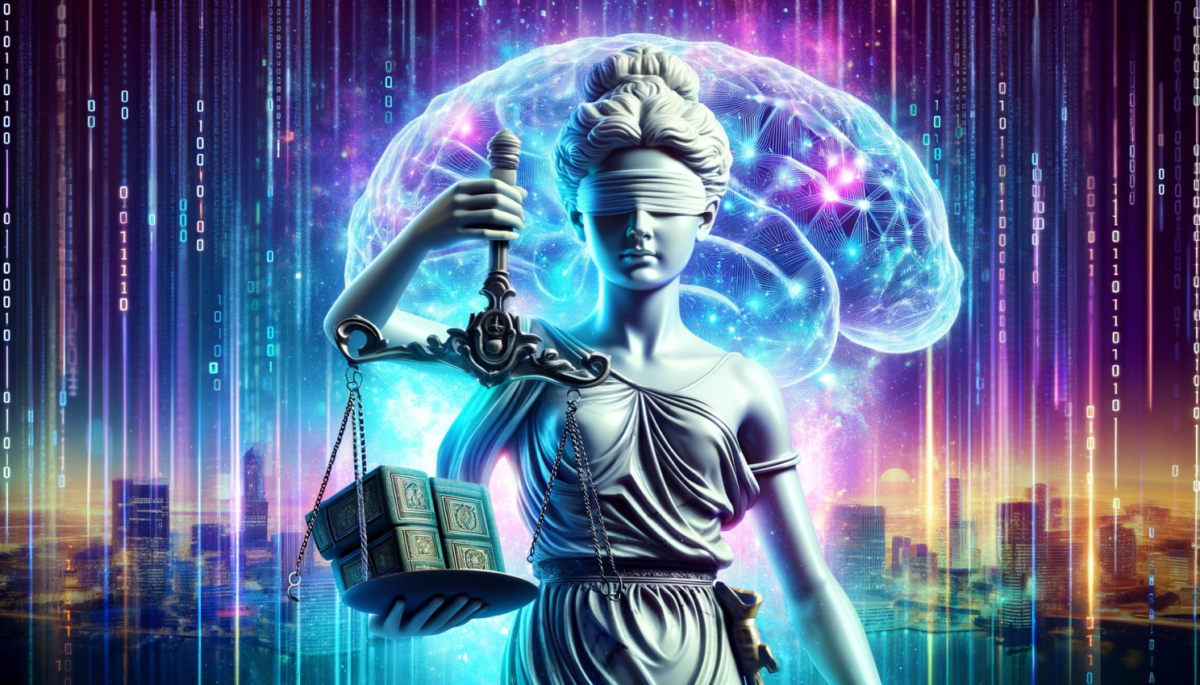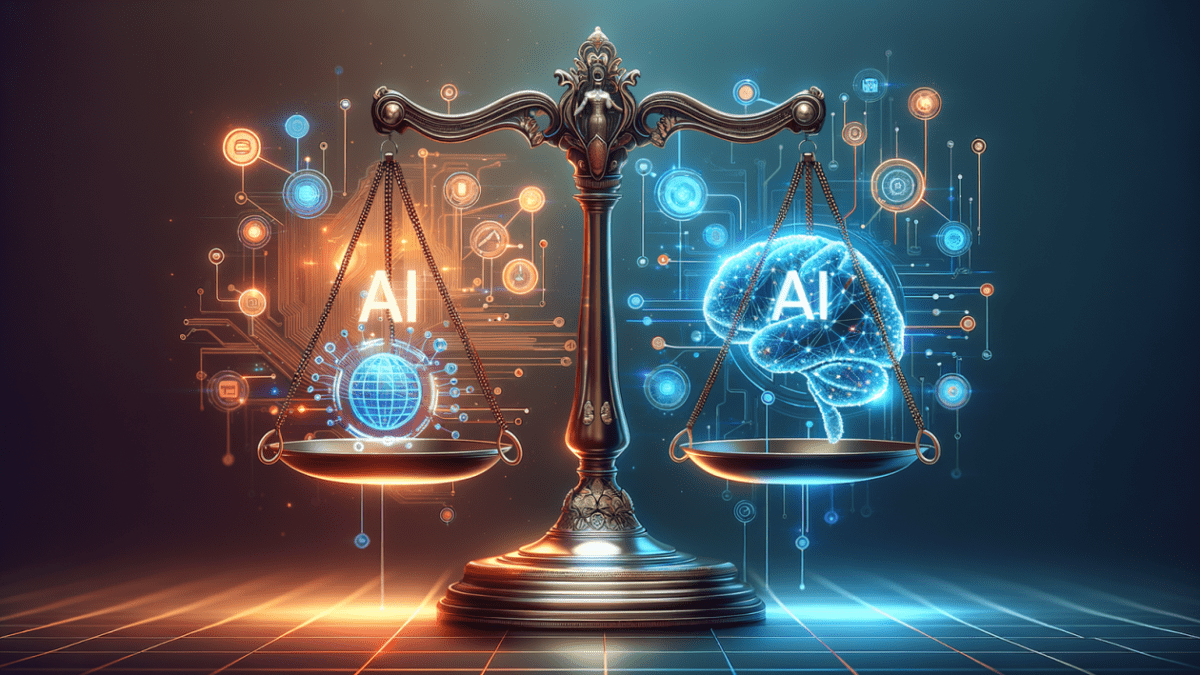
Mastering LegalTech Due Diligence with AI: A Step-by-Step Guide
23 בMay 2024
LegalTech AI Digest #1
23 בMay 2024Introduction: Embracing AI in Legal Ethics

The Accelerating Integration of AI in Law
The integration of artificial intelligence (AI) into the legal profession is not just ongoing; it’s accelerating, transforming traditional practices and introducing new ethical dimensions.
This evolution prompts a deep dive into how AI intersects with law, reshaping responsibilities and ethical boundaries.
Navigating Ethical Complexities
This article explores the intricate challenges and ethical dilemmas legal practitioners face with AI, proposes a set of best practices for effectively navigating these complexities, and looks ahead to the potential future developments at the intersection of AI and law.
The Ethical Challenges of AI in Legal Practice

Bias and Fairness
- Issue: AI’s potential to inherit and amplify societal biases.
Learn more about this issue in this analysis from The Conversation.
- Impact: Skewed legal decisions that could violate equality and due process.
Accuracy and Reliability
- Issue: The risk of errors in AI-driven legal analysis and decision-making.
For more on maintaining integrity in legal AI, see Clio’s insights.
- Impact: Possible miscarriages of justice and erosion of public trust.
Privacy and Confidentiality
- Issue: Handling sensitive client data by AI systems.
- Impact: Challenges in maintaining the sanctity of attorney-client privilege.
Responsibility and Accountability
- Issue: Defining legal liability when AI influences legal outcomes.
- Impact: Need for clear accountability frameworks to maintain trust in the legal system.
Best Practices for Ethical AI in Law

Developing Competence in AI Technology
Lawyers must ensure they are competent in their use of AI technology.
This encompasses a deep understanding of both its capabilities and limitations. Awareness and mitigation of potential biases in AI systems are crucial, requiring lawyers to engage in:
- Rigorous Data Auditing: Regular checks on the data used by AI to ensure it does not contain inherent biases.
- Algorithm Testing: Continual testing and refinement of algorithms to uphold fairness and accuracy.
- Implementation of Debiasing Techniques: Applying methods to remove or reduce bias in AI processes.
Adherence to Ethical and Legal Standards
Legal professionals should stay informed about emerging ethics opinions, guidelines, and regulatory frameworks related to AI. Proactive risk management is essential, particularly concerning:
- AI Governance: Establishing clear guidelines on AI usage within legal practices.
- Data Privacy: Ensuring compliance with data protection laws like GDPR and CCPA.
- Unauthorized Practice: Preventing AI systems from engaging in activities that require professional legal judgment.
For guidelines and professional standards, refer to the American Bar Association.
Transparency and Client Trust

Maintaining open communication with clients about the use of AI is critical. Lawyers must:
- Ensure Transparency: Clearly explain the role of AI in their services.
- Obtain Informed Consent: Secure explicit agreement from clients when AI tools are employed in their cases.
- Foster Trust: Build client trust by demonstrating ethical AI use and upholding confidentiality.
Robust Governance Frameworks
The implementation of strong governance structures is vital for the continual assessment and management of legal and ethical risks associated with AI. This includes:
- Regular Risk Assessments: Evaluating potential risks periodically to adapt to new challenges.
- Implementing Safeguards: Applying appropriate technological and procedural controls to protect client information and ensure the integrity of legal processes.
By adhering to these best practices, legal professionals can navigate the complexities of AI integration while upholding the highest standards of legal and ethical conduct.
This proactive approach ensures that AI tools enhance the legal profession without compromising the foundational principles of law.
The Future of Ethical AI in Law

Anticipating Rapid Technological Advancements
The legal profession is poised for a significant transformation as AI technologies continue to evolve and become more integrated into various domains.
From legal research and document review to predictive analytics and decision support systems, the scope of AI’s application is expanding rapidly.
This evolution necessitates a continuous refinement of ethical standards, legal frameworks, and regulatory oversight to ensure that AI’s integration into legal practice remains aligned with the core principles of justice, fairness, and the rule of law.
The Role of Professional Organizations
The American Bar Association’s formation of the Task Force on Law and Artificial Intelligence marks a significant step towards addressing the profound impact of AI on the legal profession.
Such initiatives are critical for:
- Developing Guidelines: Crafting comprehensive ethical guidelines that keep pace with technological advancements.
- Fostering Dialogue: Encouraging discussions among legal professionals about the ethical use of AI.
- Promoting Best Practices: Disseminating information on successful AI integrations and ethical practices.
Balancing Innovation with Ethical Implications
As AI technology advances, it offers the potential to improve access to legal services, streamline procedures, and enhance the accuracy of legal processes.
However, these benefits must be carefully balanced with the ethical implications of AI’s use. Ensuring that fundamental legal principles such as due process, equal protection, and human rights are upheld is paramount.
Engaging in Continuous Dialogue
The rapid pace of AI development demands that the legal community remain actively engaged in ongoing discussions about how best to harness this technology. By:
- Maintaining Active Engagement: Keeping abreast of the latest AI developments and ethical concerns.
- Updating Ethical Standards and Practices: Continuously revising ethical standards to reflect new technological realities.
- Ensuring Safeguards and Integrity: Upholding the highest standards of ethical conduct and safeguarding the integrity of the legal system.
Conclusion

The integration of AI into the legal profession presents a complex array of ethical challenges.
These challenges require informed, proactive, and collaborative responses.
By adhering to established best practices and embracing ethical governance frameworks, the legal profession can effectively navigate these challenges.
Remaining vigilant to the rapid developments in AI technology allows legal professionals to harness the benefits of AI ethically and effectively, ultimately serving the interests of justice and the rule of law.
Interested in exploring more about Ethical AI in Law or LegalTech?
✉️ Join our LegalTech AI Digest Newsletter
🤖 Discover Our Legal AI Agent (New): Click here
🌐 Visit Our Website: Click here
🫂 Join Our LinkedIn Community: International / Israel
✉️ Subscribe to Our Newsletter: Click here
Further Reading
- “Creating the Law Firm of the Future: Navigating Legal Ethics & Artificial Intelligence.” American Bar Association, Apr. 2024, https://www.americanbar.org/groups/gpsolo/resources/ereport/2024-april/creating-law-firm-future-navigating-legal-ethics-artificial-intelligence/.
- “Lawyers Are Rapidly Embracing AI. Here’s How to Avoid an Ethical Disaster.” The Conversation, 19 Jan. 2024, https://theconversation.com/lawyers-are-rapidly-embracing-ai-heres-how-to-avoid-an-ethical-disaster-221135.
- “The Implications of ChatGPT for Legal Services and Society.” Harvard Law School Center on the Legal Profession, https://clp.law.harvard.edu/knowledge-hub/magazine/issues/generative-ai-in-the-legal-profession/.
- Gordon, John-Stewart. “Ethical and Legal Dimensions of AI, Personhood, and Autonomous Systems.” MIT Press, vol. 10, no. 1007, June 2021, doi:10.1007/s00146-021-01194-0. https://doi.org/10.1007/s00146-021-01194-0.
- “Legal Ethics in the Use of Artificial Intelligence.” Squire Patton Boggs, Feb. 2019, https://www.squirepattonboggs.com/-/media/files/insights/publications/2019/02/legal-ethics-in-the-use-of-artificial-intelligence/legalethics_feb2019.pdf.
- “AI and Law: What Are the Ethical Considerations?” Clio, https://www.clio.com/resources/ai-for-lawyers/ethics-ai-law/.
- “What Are the Ethical Implications of Artificial Intelligence Use in Legal Practice?” Bloomberg Law, https://news.bloomberglaw.com/us-law-week/what-are-the-ethical-implications-of-artificial-intelligence-use-in-legal-practice-1.
- “Artificial Intelligence and Legal Practice: Ethical and Practical Issues.” Springer, 2024, doi:10.1007/s44163-024-00121-8. https://link.springer.com/article/10.1007/s44163-024-00121-8.
#LegalTech #EthicalAI #AIinLaw #LegalInnovation

